Learn How To Build Artificial Intelligence In Mobile Applications

In the ever-evolving landscape of mobile applications, one technology stands out as a game-changer: Artificial Intelligence. Imagine apps that not only understand your needs but anticipate them, learn and adapt to your preferences, and seamlessly integrate into your daily life. Welcome to the world of AI-powered mobile apps, where innovation knows no bounds.
One name shines brightly when it comes to harnessing the potential of AI in mobile app development: Alternative-spaces.
With a proven track record and an extensive portfolio, Alternative-spaces has embraced and mastered the art of creating AI-powered mobile apps that redefine user experiences. Join us in this article as we delve into the intricacies of how to build an AI mobile app and explore the vast expertise that Alternative-spaces brings to the table.
Table of contents
- How Does Artificial Intelligence Enhance Mobile App Development?
- How AI Technology Can Be Used in Mobile Applications Development?
- Points To Consider Before AI App Development
- Industries that Benefit from Artificial Intelligence Mobile App Development
- How to Build AI Mobile App: Key Steps & Considerations
- How Much Does It Cost To Build A Mobile App With AI?
- How Alternative-spaces Can Help With AI App Development
- The Final Thoughts
- FAQ
How Does Artificial Intelligence Enhance Mobile App Development?
Artificial Intelligence has ushered in a new era of how to create AI mobile apps, where innovation knows no bounds. With its ability to process vast amounts of data, recognize patterns, and learn from user interactions, AI has become a transformative force in creating mobile apps that truly understand and cater to users’ needs.
From personalized recommendations and predictive analysis to natural language processing and image recognition, AI empowers developers to craft apps that seamlessly adapt and evolve, providing users with intuitive and tailored experiences.
AI-driven mobile app development accelerates the creation process by automating complex tasks, optimizing performance, and unlocking insights from user behavior. It sets a new standard for functionality, engagement, and user satisfaction. Here are some of the examples:
- Personalized Recommendations: AI-powered apps analyze user behavior and preferences to provide tailored content and recommendations. For instance, music streaming apps like Spotify use AI algorithms to suggest songs and playlists based on listening history, enhancing user engagement and satisfaction.
- Automated Testing and Bug Detection: AI automates testing processes, identifying real-time bugs and issues during app development. This leads to faster debugging and improved app stability. Mobile game developers leverage AI testing tools to ensure smooth gameplay across different devices and scenarios.
- Natural Language Processing (NLP): Apps like chatbots and virtual assistants utilize NLP to understand and respond to user input in natural language. Language translation apps, for example, use AI-driven NLP to provide accurate translations, breaking down language barriers and enhancing global communication.
- Predictive Analytics: AI analyzes user data to predict future actions and behaviors. E-commerce apps leverage this by suggesting products users will likely buy based on browsing history and purchase patterns. This increases sales opportunities and customer satisfaction.
- Image Recognition and Augmented Reality (AR): AI-powered image recognition enhances user experiences by enabling apps to identify and interact with real-world objects. AR apps like Pokémon GO overlay digital elements onto the physical world, creating immersive and engaging interactions.
How AI Technology Can Be Used in Mobile Applications Development?
Artificial Intelligence has ushered in a new era of possibilities for mobile app development, unlocking a range of innovative features and functionalities that enhance user experiences across various domains. Here are the top compelling examples of how AI can be harnessed in mobile apps:
Healthcare Diagnostics and Monitoring
Mobile health apps equipped with AI can revolutionize diagnostics and monitoring. An app like ‘Your MD’ utilizes AI to offer personalized health information and symptom analysis, helping users understand potential health issues and guiding them toward appropriate medical care. Additionally, ‘Eko’ employs AI to enhance stethoscope recordings, detecting heart murmurs and anomalies for more accurate cardiac assessments.
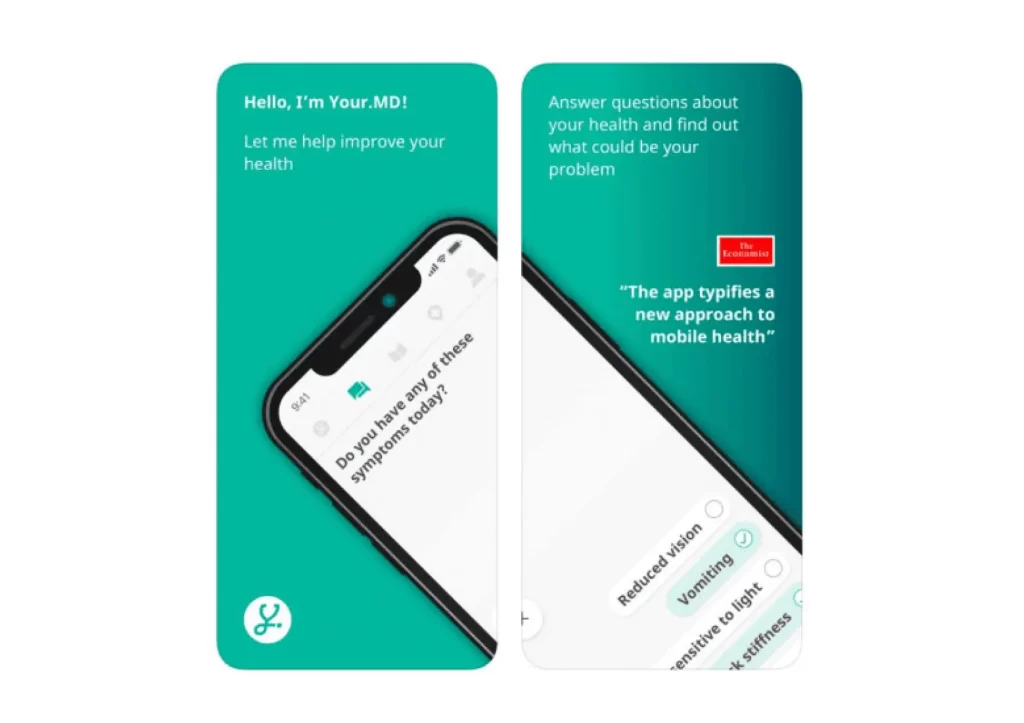
Language Translation and Communication
Language barriers dissolve with AI-driven translation apps. Google Translate employs neural machine translation to provide real-time language conversion, making communication seamless for travelers and global citizens. These apps can translate text, speech, and even images, facilitating cross-cultural understanding.
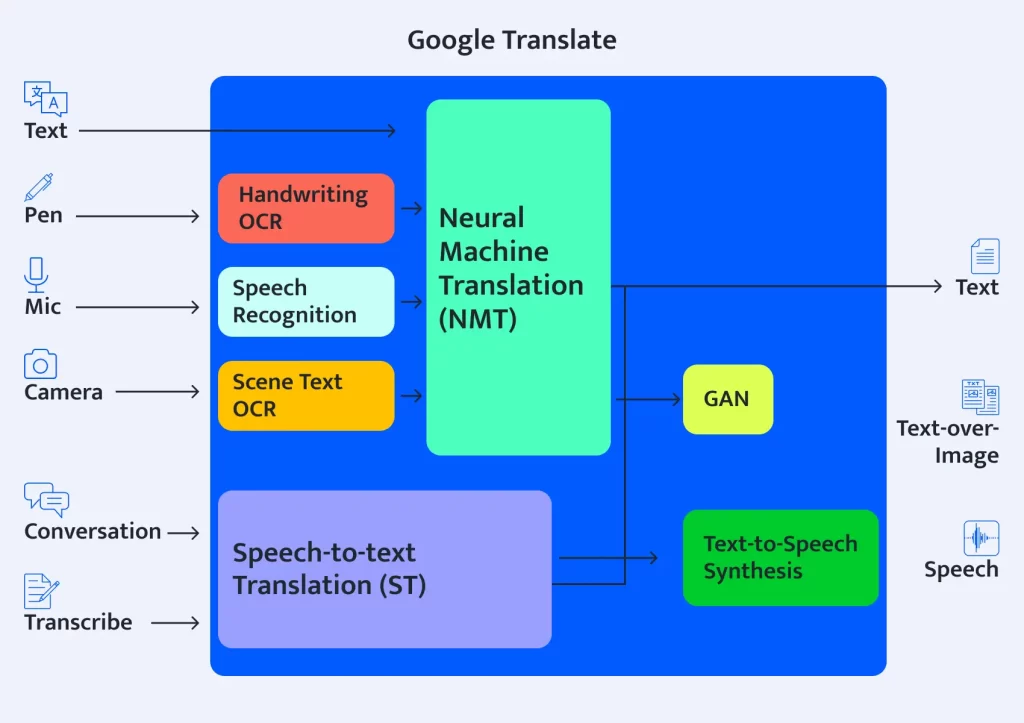
Virtual Assistants and Chatbots
Virtual assistants like ‘Siri’ and chatbots embedded in apps streamline user interactions. ‘Amelia’ is an AI-powered customer service chatbot that assists users with various tasks, from making reservations to troubleshooting issues. Such AI-driven assistants provide immediate responses and round-the-clock availability.
Personalized Recommendations and Content Curation
These are prominent examples of how AI transforms the mobile app landscape, delivering tailor-made experiences that cater to individual preferences and interests. This approach enhances user engagement and satisfaction by presenting content that resonates with them on a deeper level. Here are more examples of AI-powered apps that excel in this domain:
- YouTube Recommendations: YouTube employs AI algorithms to analyze user viewing history, search patterns, and engagement metrics to suggest videos that align with users’ interests. This approach keeps users engaged and introduces them to new content they find appealing.
- Pandora Music Streaming: Pandora’s Music Genome Project utilizes AI to analyze the musical characteristics of songs, creating personalized radio stations that match users’ preferred genres, artists, and moods. The AI engine evolves as users interact, providing an ever-improving playlist curation.
- Netflix Content Suggestions: Netflix employs sophisticated AI algorithms to analyze user behavior and preferences. The ‘Recommended for You’ section suggests movies and TV shows that align with users’ past viewing habits, enhancing the likelihood of content discovery.
- Pinterest Visual Discovery: Pinterest’s visual search feature employs AI to identify objects in images and suggest related pins. Users can take a picture of an item, and the app will curate pins based on the specified thing, streamlining content curation and inspiration.
- Spotify’s Discover Weekly: Spotify’s ‘Discover Weekly’ playlist is a prime example of AI-driven content curation. By analyzing the music users listen to and enjoy, Spotify generates a unique playlist of recommended songs every week, introducing users to new tracks they might love.
- Amazon Product Recommendations: Amazon’s AI-powered recommendation engine suggests products to users based on browsing history, purchase behavior, and similar customer preferences. This personalized approach drives increased sales and customer satisfaction.
- News Aggregator Apps: Apps like ‘Flipboard’ use AI algorithms to curate news articles and stories based on users’ interests. By analyzing reading habits and saved articles, the app delivers a customized news feed informing users on topics they care about.
- Dating Apps: Dating apps like Tinder and Bumble use AI algorithms to suggest potential matches based on users’ swiping behavior, interests, and profile information. This approach enhances the likelihood of meaningful connections.
These examples underscore the power of AI in creating seamless and engaging experiences for users by offering content that aligns with their preferences. As AI technologies evolve, personalized recommendations and content curation will remain a driving force in shaping user interactions with mobile apps.

Enhanced Visual and Augmented Reality (AR) Experiences
AI enhances visual interactions in apps, especially those utilizing AR. ‘Snapchat’ uses AI-powered filters that adapt to facial features and expressions in real time, creating engaging and interactive visual experiences. Similarly, apps like ‘Google Lens’ can identify objects through the device’s camera and provide relevant information.

These examples underscore the versatility of AI in mobile apps, transcending industries and offering functionalities that were once considered futuristic. As AI continues to evolve, it will undoubtedly drive further innovation and redefine how users interact with and benefit from their mobile applications.
Points To Consider Before AI App Development
When you build an AI-powered mobile app, it involves both technical and business considerations to ensure successful integration and maximum value. Here are six points to consider, supported by examples:
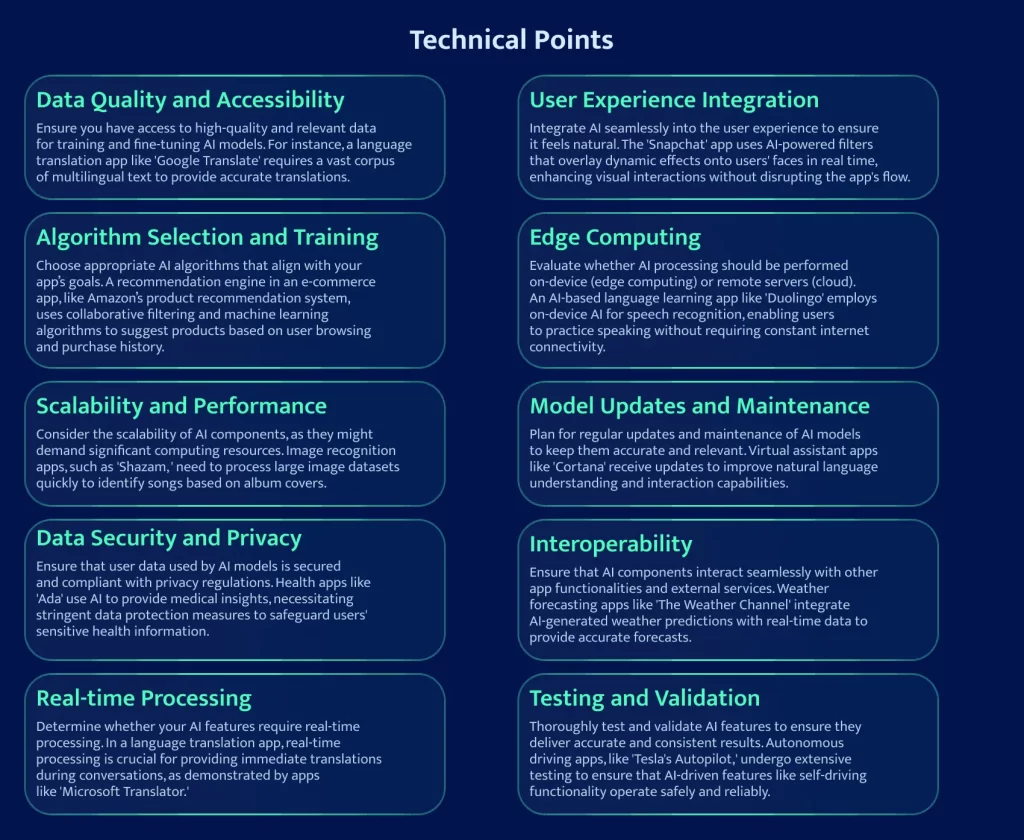
Technical Points:
- Data Quality and Accessibility: Ensure you have access to high-quality and relevant data for training and fine-tuning AI models. For instance, a language translation app like ‘Google Translate’ requires a vast corpus of multilingual text to provide accurate translations.
- Algorithm Selection and Training: Choose appropriate AI algorithms that align with your app’s goals. A recommendation engine in an e-commerce app, like Amazon’s product recommendation system, uses collaborative filtering and machine learning algorithms to suggest products based on user browsing and purchase history.
- Scalability and Performance: Consider the scalability of AI components, as they might demand significant computing resources. Image recognition apps, such as ‘Shazam,’ need to process large image datasets quickly to identify songs based on album covers.
- Data Security and Privacy: Ensure that user data used by AI models is secured and compliant with privacy regulations. Health apps like ‘Ada’ use AI to provide medical insights, necessitating stringent data protection measures to safeguard users’ sensitive health information.
- Real-time Processing: Determine whether your AI features require real-time processing. In a language translation app, real-time processing is crucial for providing immediate translations during conversations, as demonstrated by apps like ‘Microsoft Translator.’
- User Experience Integration: Integrate AI seamlessly into the user experience to ensure it feels natural. The ‘Snapchat’ app uses AI-powered filters that overlay dynamic effects onto users’ faces in real time, enhancing visual interactions without disrupting the app’s flow.
- Edge Computing: Evaluate whether AI processing should be performed on-device (edge computing) or on remote servers (cloud). An AI-based language learning app like ‘Duolingo’ employs on-device AI for speech recognition, enabling users to practice speaking without requiring constant internet connectivity.
- Model Updates and Maintenance: Plan for regular updates and maintenance of AI models to keep them accurate and relevant. Virtual assistant apps like ‘Cortana’ receive updates to improve natural language understanding and interaction capabilities.
- Interoperability: Ensure that AI components interact seamlessly with other app functionalities and external services. Weather forecasting apps like ‘The Weather Channel’ integrate AI-generated weather predictions with real-time data to provide accurate forecasts.
- Testing and Validation: Thoroughly test and validate AI features to ensure they deliver accurate and consistent results. Autonomous driving apps, like ‘Tesla’s Autopilot,’ undergo extensive testing to ensure that AI-driven features like self-driving functionality operate safely and reliably.
Considering these technical considerations will help you implement AI effectively in your mobile app, ensuring optimal performance, user satisfaction, and alignment with your app’s objectives.
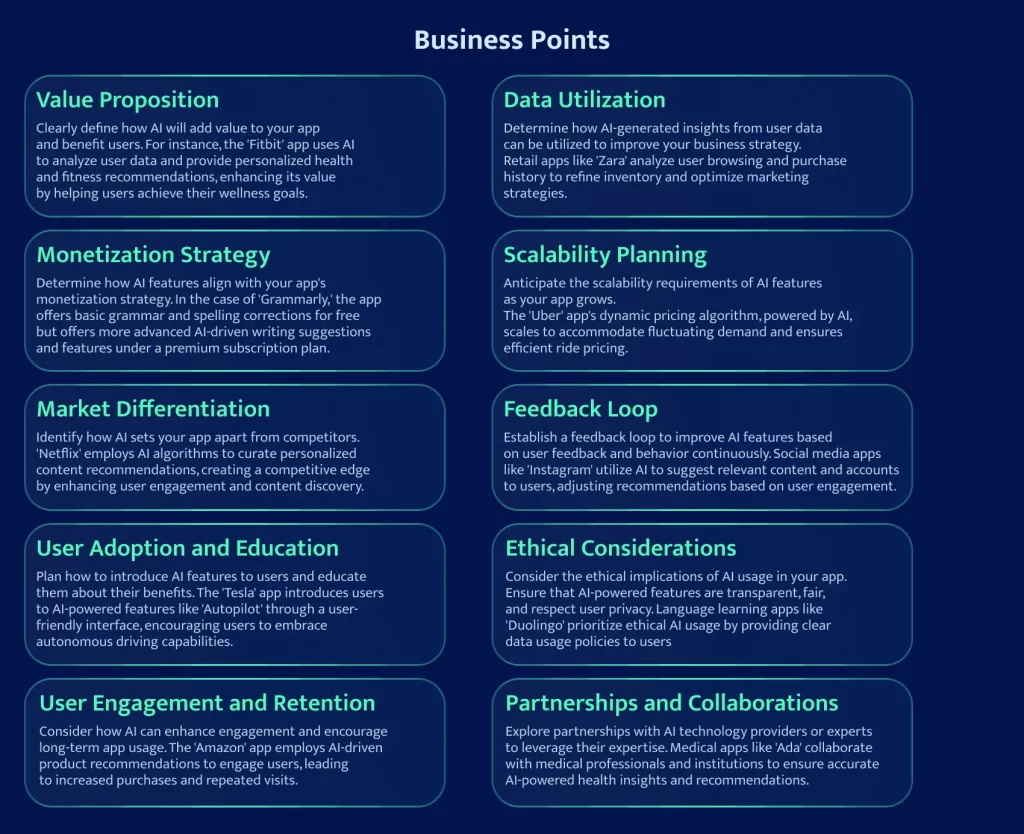
Business Points:
- Value Proposition: Clearly define how AI will add value to your app and benefit users. For instance, the ‘Fitbit’ app uses AI to analyze user data and provide personalized health and fitness recommendations, enhancing its value by helping users achieve their wellness goals.
- Monetization Strategy: Determine how AI features align with your app’s monetization strategy. In the case of ‘Grammarly,’ the app offers basic grammar and spelling corrections for free but offers more advanced AI-driven writing suggestions and features under a premium subscription plan.
- Market Differentiation: Identify how AI sets your app apart from competitors. ‘Netflix’ employs AI algorithms to curate personalized content recommendations, creating a competitive edge by enhancing user engagement and content discovery.
- User Adoption and Education: Plan how to introduce AI features to users and educate them about their benefits. The ‘Tesla’ app introduces users to AI-powered features like ‘Autopilot’ through a user-friendly interface, encouraging users to embrace autonomous driving capabilities.
- User Engagement and Retention: Consider how AI can enhance engagement and encourage long-term app usage. The ‘Amazon’ app employs AI-driven product recommendations to engage users, leading to increased purchases and repeated visits.
- Data Utilization: Determine how AI-generated insights from user data can be utilized to improve your business strategy. Retail apps like ‘Zara’ analyze user browsing and purchase history to refine inventory and optimize marketing strategies.
- Scalability Planning: Anticipate the scalability requirements of AI features as your app grows. The ‘Uber’ app’s dynamic pricing algorithm, powered by AI, scales to accommodate fluctuating demand and ensures efficient ride pricing.
- Feedback Loop: Establish a feedback loop to improve AI features based on user feedback and behavior continuously. Social media apps like ‘Instagram’ utilize AI to suggest relevant content and accounts to users, adjusting recommendations based on user engagement.
- Ethical Considerations: Consider the ethical implications of AI usage in your app. Ensure that AI-powered features are transparent, fair, and respect user privacy. Language learning apps like ‘Duolingo’ prioritize ethical AI usage by providing clear data usage policies to users.
- Partnerships and Collaborations: Explore partnerships with AI technology providers or experts to leverage their expertise. Medical apps like ‘Ada’ collaborate with medical professionals and institutions to ensure accurate AI-powered health insights and recommendations.
Considering these technical and business points and relevant examples will help you implement AI successfully in your mobile app, providing users with valuable and engaging experiences while aligning with your business objectives.
Read also about how AI will transform your business.
Industries that Benefit from Artificial Intelligence Mobile App Development
AI mobile app development has transformative potential across various industries, enhancing user experiences, optimizing processes, and driving innovation. Here are several initiatives that greatly benefit from AI-powered mobile apps:
Healthcare
AI assists in disease diagnosis by analyzing medical images and patient data, aiding doctors in making accurate decisions. It also personalizes treatment plans by analyzing patient history and genetic information. Additionally, AI-driven apps enable remote patient monitoring, allowing healthcare providers to track patients’ health conditions in real time.
Finance and Banking
AI improves fraud detection by analyzing transaction patterns and identifying unusual behavior. It also automates customer service through chatbots, enhancing user experience and addressing inquiries promptly. In investment, AI-powered apps analyze market trends and user preferences to suggest personalized investment strategies.
E-commerce and Retail
AI-driven apps offer personalized product recommendations based on user behavior and preferences. They also optimize inventory management by predicting demand patterns and reducing overstocking or stockouts. Moreover, AI enables dynamic pricing strategies that adjust based on real-time market conditions.
Transport and Logistics
AI optimizes route planning for efficient transportation, reducing fuel consumption and delivery times. It enhances predictive maintenance by analyzing sensor data from vehicles and machinery, preventing breakdowns, and minimizing downtime. AI-powered apps also improve user experiences by providing real-time traffic updates and suggesting alternative routes.
Entertainment and Media
AI enhances content recommendations by analyzing user viewing habits and preferences, leading to more personalized content delivery. It also improves content creation by automating tasks such as video editing and generating customized marketing materials, increasing efficiency and creativity.
In these industries, AI mobile app development leverages data analysis, machine learning, and automation to streamline processes, enhance user experiences, and drive innovation.
How to Build AI Mobile App: Key Steps & Considerations
Building an AI-powered app involves a strategic approach encompassing various stages, from conceptualization to deployment. Here’s a more detailed breakdown of the critical steps and considerations in six stages:
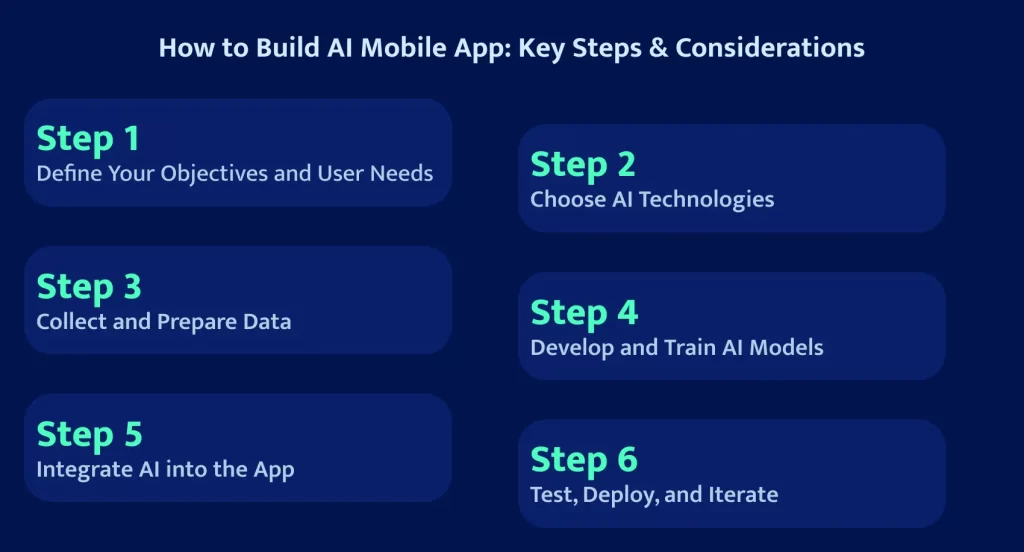
Step 1: Define Your Objectives and User Needs
Clearly outline the purpose of your AI app. Identify the problem you intend to solve or the value you aim to deliver through AI capabilities. Understand your target audience’s needs, preferences, and pain points. This initial groundwork will guide your app’s development and ensure its relevance.
Step 2: Choose AI Technologies
Select the AI technologies that align with your app’s objectives. Determine whether machine learning, natural language processing, computer vision, or combining these will best serve your goals. Research and assess which AI frameworks, libraries, and tools are suited for your chosen technologies.
Step 3: Collect and Prepare Data
Gather the relevant and diverse data needed to train your AI models effectively. This data will serve as the foundation for accurate predictions and insights. Clean, preprocess, and label the data to ensure it’s suitable for training and representative of real-world scenarios.
Step 4: Develop and Train AI Models
Work with data scientists and AI experts to design, develop, and train your AI models. This involves selecting appropriate algorithms, architecture, and parameters. Use historical data to train the models, continuously iterating and refining until you achieve the desired accuracy.
Step 5: Integrate AI into the App
Integrate the trained AI models into your app’s architecture and user interface. Ensure that AI features seamlessly blend with the app’s overall design and functionality. Develop a user-friendly interface for accessing and interacting with AI-driven capabilities.
Step 6: Test, Deploy, and Iterate
Rigorously test the AI app to identify and address any bugs, errors, or performance issues. Test not only the AI features themselves but also their integration with the app as a whole. Once testing is complete, deploy the app to the intended platforms. Gather user feedback and data to refine and improve the AI models and app features continuously.
Key Considerations:
- Data Quality and Privacy: Ensure data quality, integrity, and security throughout development. Address privacy concerns and comply with data protection regulations to build user trust.
- User Experience: Prioritize user experience in the design of AI features. Ensure they enhance the app’s value and provide a seamless and intuitive interaction.
- Scalability: Design your AI infrastructure with scalability in mind so the app can handle increased user demand and data volume as it gains popularity.
- Ethical and Bias Considerations: Be mindful of ethical implications and potential biases in your AI models. Strive for fairness, transparency, and accountability.
- Continuous Learning and Improvement: AI models can benefit from continuous learning. Implement mechanisms to gather user feedback and performance data, enabling iterative improvements.
- Expert Collaboration: Collaborate with AI experts, data scientists, and domain specialists to ensure your app’s AI capabilities are accurate, relevant, and aligned with industry best practices.
By following these steps and considerations, you can develop an AI-powered app that offers valuable and innovative functionalities, positively impacting users and addressing real-world challenges.
How Much Does It Cost To Build A Mobile App With AI?
AI development cost can vary widely depending on various factors, including the complexity of the AI features, the scope of the app, the platform(s) it will run on, the development team’s location and expertise, and additional functionalities. Here’s a breakdown of some cost considerations:
- AI Complexity: The more complex the AI features, the higher the development cost. Basic AI functionalities, like integrating pre-built AI models, might be more affordable than custom AI solutions that require extensive data collection and model training.
- App Scope and Features: The number and complexity of features beyond AI will contribute to the cost. This includes user interface design, database integration, third-party API integrations, and more.
- Platform: Developing for multiple platforms (iOS, Android, web) can increase costs. Cross-platform development tools may help reduce expenses compared to building separate native apps.
- Development Team: The size and expertise of the development team impact costs. Hiring experienced AI developers and data scientists generally incurs higher expenses.
- Data Collection and Preparation: Collecting, cleaning, and preparing data for AI models can be time-consuming and add to costs.
- AI Model Training and Optimization: Developing custom AI models requires expertise and time for training, optimization, and fine-tuning, which can increase development costs.
- User Experience Design: A well-designed user interface and user experience contribute to app success. Investing in UI/UX design can add to the overall cost.
- Testing and Quality Assurance: Rigorous testing, including testing AI models for accuracy and performance, adds to development time and costs.
- Maintenance and Updates: Ongoing maintenance, updates, and improvements to AI models contribute to long-term costs.
- Deployment and App Stores: Costs may include app store registration fees and compliance with store guidelines.
- Legal and Data Privacy: Addressing legal and data privacy considerations, especially when handling user data, can lead to additional expenses.
Considering these factors, the cost of developing a mobile app with AI can range from thousands to hundreds of thousands of dollars. For a basic app with integrated AI features, you might be looking at a starting cost of $20,000 to $50,000. More complex apps with custom AI functionalities can range from $100,000 to $500,000 or more. It’s essential to consult with development professionals to get a more accurate estimate based on your specific project requirements.
How Alternative-spaces Can Help With AI App Development
With years of experience in the field, Alternative-spaces specializes in developing machine learning and artificial intelligence systems. Our expertise extends to crafting applications for language and image processing and seamlessly integrating advanced technologies into existing products. This wealth of knowledge empowers our global clientele to harness state-of-the-art technology, revealing valuable insights, enhancing decision-making processes, and pioneering innovative solutions that drive business expansion.
As an illustration, we’ve recently created a virtual assistant designed to undertake various tasks typically managed by HR professionals. For instance, the chatbot generates holiday greetings and other standard HR-related messages, streamlining communication processes.
The Final Thoughts
Integrating AI into mobile app development is a transformative force across industries in a rapidly evolving technological landscape. By harnessing AI’s capabilities, businesses can unlock personalized experiences, optimize processes, and drive innovation. Whether you envision a healthcare app that aids in diagnostics or an e-commerce platform with personalized recommendations, Alternative-spaces is here to guide you. Our extensive experience in developing AI-powered mobile apps ensures you’ll be equipped to navigate the complexities of this exciting journey. Contact Alternative-spaces today to discuss your aspirations for an AI-powered future app. Together, we’ll shape the next generation of mobile experiences.
FAQ
Q1: What is the significance of AI in mobile app development?
AI in mobile app development brings enhanced user experiences, personalized recommendations, and process optimization across various industries, from healthcare to retail. It empowers apps to understand user behavior, make data-driven predictions, and provide innovative solutions.
Q2: How can AI be integrated into mobile apps?
AI can be integrated through various methods, such as incorporating pre-built AI models, developing custom algorithms, and utilizing AI-powered APIs. These approaches enable apps to offer features like personalized recommendations, virtual assistants, and predictive analytics.
Q3: How can Alternative-spaces assist in AI app development?
Alternative-spaces brings years of expertise in creating AI-powered mobile apps, from machine learning models to natural language processing. If you’re looking to harness the potential of AI in your app, you can contact Alternative-spaces to discuss your project, leveraging their knowledge and experience to craft innovative solutions.
Content created by our partner, Onix-systems.

 Home
Home